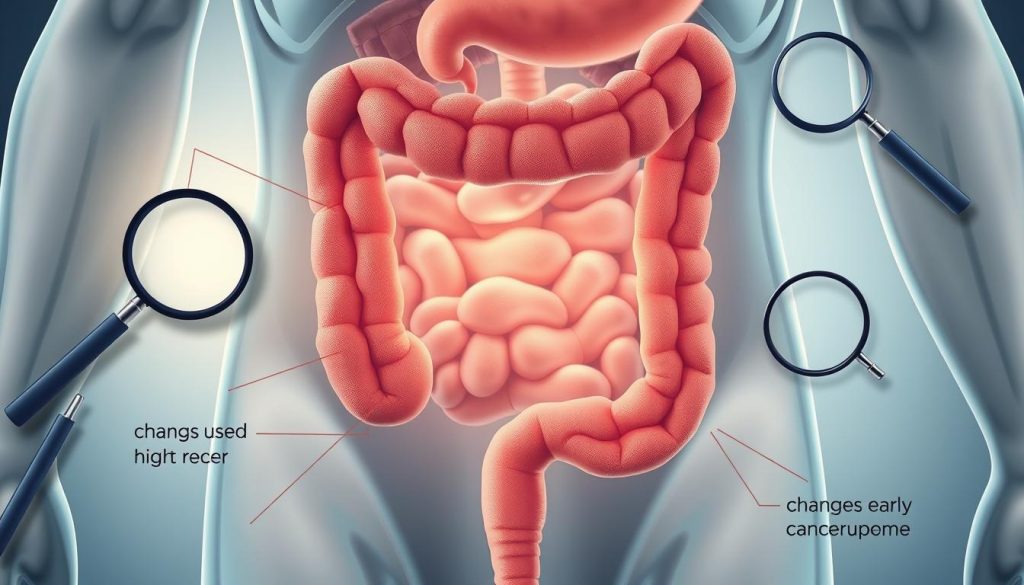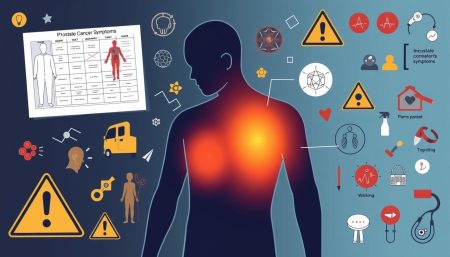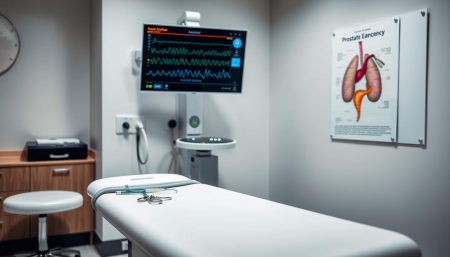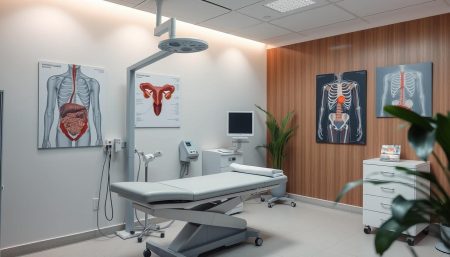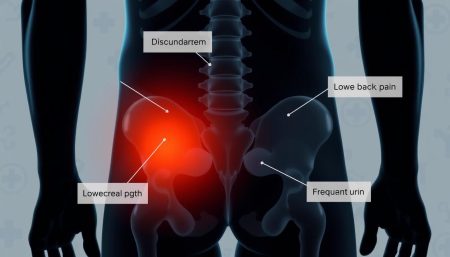Colon cancer often starts quietly, making it vital to spot its early signs. Knowing these signs can save lives. This disease affects the large intestine and might not show symptoms at first.
Recognizing colon cancer symptoms is essential for early detection. Symptoms can include changes in bowel habits or unexplained weight loss. Even small changes should not be ignored. Paying attention to your body’s signals is critical.
In this guide, we’ll cover the early signs of colon cancer. You’ll learn what to watch for and when to see a doctor. Being informed is the first step to staying healthy.
Understanding Colon Cancer: A Comprehensive Overview
Colon cancer is a serious health issue in the U.S. Knowing about it can help you catch it early. Let’s look at the basics of colorectal cancer and how it starts.
What is Colorectal Cancer?
Colorectal cancer happens in the colon or rectum. It starts with small growths called polyps. These can turn into cancer if not caught early.
The Anatomy of Your Colon
Your colon is part of your digestive system. It’s a long tube that helps digest food and remove waste. Each part of the colon has a role in digestion.
| Colon Section | Function |
|---|---|
| Ascending Colon | Absorbs water and nutrients |
| Transverse Colon | Moves waste across the abdomen |
| Descending Colon | Stores waste before elimination |
| Sigmoid Colon | Connects to the rectum |
How Cancer Develops in the Colon
Cancer in the colon starts with cells growing out of control. This happens in the inner lining of the colon. As these cells grow, they can form tumors. Signs of colorectal cancer may not show until the tumor gets bigger.
Knowing the signs of colorectal cancer can save lives. Regular screenings are key to catching it early. If you notice any unusual changes in your bowel habits, talk to your doctor right away.
Signs of Colon Cancer: Common Warning Signals
Spotting colon cancer symptoms early can save lives. These signs don’t always mean cancer, but they’re important to watch. Knowing your body’s changes helps find problems early.
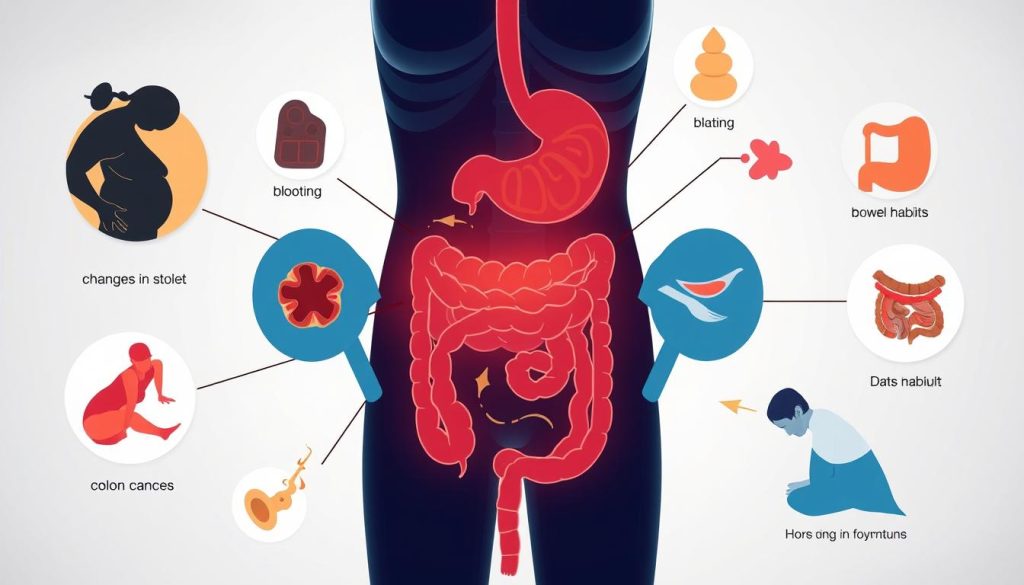
- Changes in bowel habits
- Blood in stool
- Unexplained weight loss
- Persistent abdominal discomfort
- Fatigue or weakness
Symptoms vary from person to person. Some might see many signs, while others see none. Here’s a table showing common symptoms and how often they occur:
| Symptom | Frequency |
|---|---|
| Changes in bowel habits | Very common |
| Rectal bleeding | Common |
| Abdominal pain | Common |
| Unexplained weight loss | Less common |
| Fatigue | Less common |
If you see any symptoms lasting more than a few weeks, see your doctor. Finding colon cancer early can greatly improve treatment and survival chances. Being proactive about your health is essential in managing risks.
Changes in Bowel Habits as Early Indicators
Your bowel habits can tell a lot about your health. Changes in these habits might mean colon cancer is present. Watch for any shifts in your routine, as they could point to health problems.
Persistent Diarrhea or Constipation
Diarrhea or constipation that lasts more than a few days could be a sign. If your bowel movements keep changing, see a doctor.
Narrow Stools or Changes in Stool Shape
The shape of your stool is important. If your stools are narrow or their shape changes, it might mean a growth in the colon. These signs are often missed early on but shouldn’t be ignored.
Frequency Changes in Bowel Movements
A sudden change in how often you go to the bathroom is a red flag. If you’re going more or less than usual, talk to your healthcare provider. It could be a sign of colon cancer symptoms.
While these signs might point to colon cancer, they could also mean other health issues. It’s key to talk to your doctor about any lasting changes. This way, you get the right care and evaluation on time.
Blood in Stool: When to Be Concerned
Blood in the stool is a symptom that often causes alarm. It’s one of the key signs of colon cancer that shouldn’t be ignored. While not all instances of blood in stool indicate cancer, it’s important to know when to seek medical attention.

Colon cancer warning signs can be subtle, but blood in the stool is typically more noticeable. The appearance of blood can vary. It might be bright red, dark red, or even black, depending on where the bleeding occurs in the digestive tract.
Here’s a breakdown of what different types of blood in stool could mean:
| Blood Appearance | Possible Cause | Level of Concern |
|---|---|---|
| Bright red on toilet paper | Hemorrhoids or anal fissures | Low to moderate |
| Dark red mixed with stool | Bleeding in lower intestine or colon | High |
| Black, tarry stool | Bleeding in upper digestive tract | High |
If you notice any persistent changes in your stool color or consistency, it’s time to consult a doctor. This is true, even if you’re not sure if it’s related to colon cancer. Early detection through proper screening and prompt attention to symptoms can significantly improve outcomes in colon cancer cases.
Unexplained Weight Loss and Appetite Changes
Weight loss and changes in appetite can signal colorectal cancer. These signs are often missed or blamed on other things. It’s key to know them for early detection.
Sudden Weight Loss Without Trying
Unexplained weight loss is a common symptom of colon cancer. Losing 10 pounds or more without diet or exercise changes means you should see a doctor. Cancer cells use up the body’s energy, leading to weight loss.
Changes in Eating Patterns
Colon cancer can mess with your appetite. You might eat less or feel less full after meals. This happens because the tumor affects digestion and nutrient absorption.
Feeling Full Too Quickly
Feeling full after eating small amounts is another sign. This could be because the tumor presses on the stomach or changes hormone levels that control hunger.
| Symptom | Description | Action |
|---|---|---|
| Unexplained Weight Loss | Losing 10+ pounds without trying | Consult a doctor |
| Appetite Changes | Decreased interest in food | Monitor eating habits |
| Early Satiety | Feeling full after small meals | Keep a food diary |
If you notice these signs of colorectal cancer, get medical help fast. Early detection can greatly improve treatment results.
Abdominal Pain and Discomfort Patterns
Abdominal pain is a key symptom of colon cancer that should not be ignored. This discomfort can range from mild to severe and may occur in different areas of the belly. Understanding these pain patterns is key for spotting colon cancer red flags.
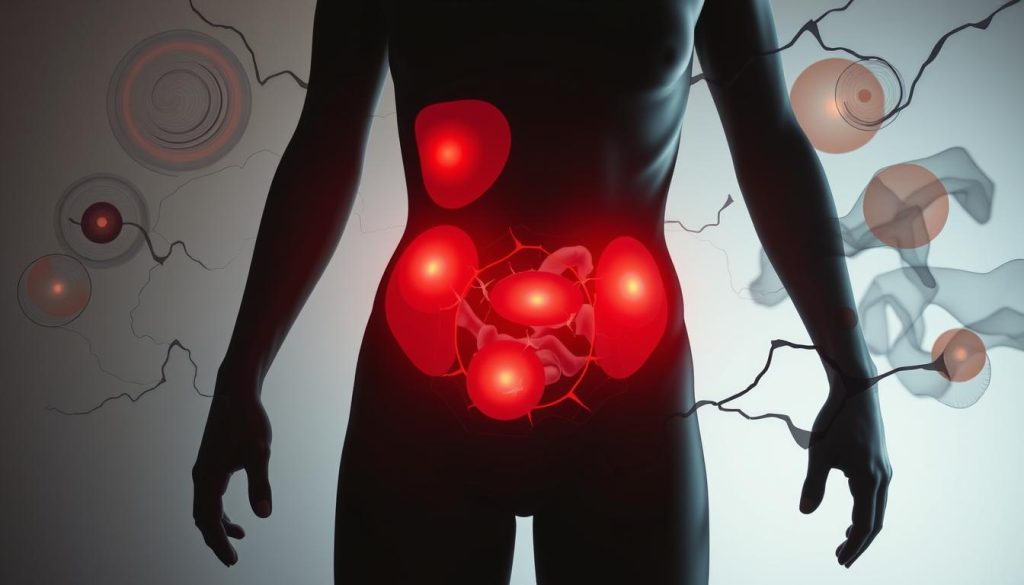
The nature of abdominal pain linked to colon cancer varies. Some feel sharp, stabbing pains, while others experience a dull ache or cramping. The pain’s location often shows where the tumor is in the colon.
Here’s a breakdown of common abdominal pain patterns related to colon cancer:
| Pain Location | Description | Possible Indication |
|---|---|---|
| Lower left abdomen | Persistent ache or cramps | Tumor in descending colon |
| Lower right abdomen | Sharp pain or discomfort | Tumor in ascending colon |
| Middle abdomen | Bloating or gas-like pain | Tumor in transverse colon |
| Entire abdomen | General discomfort or tenderness | Advanced stage cancer |
Abdominal pain can be caused by many conditions, not just colon cancer. If you have persistent or severe pain, seek medical help. This is true if you notice other symptoms of colon cancer too.
Fatigue and Weakness as Warning Signs
Feeling tired all the time? It might be more than just not sleeping well. Persistent fatigue is one of the early signs of colon cancer that often goes unnoticed. Let’s look into how this common symptom might signal something serious.
Chronic Tiredness
Feeling extremely tired that doesn’t get better with rest is a warning sign. If you’re always exhausted, even after sleeping well, it’s time to listen. This kind of fatigue is not normal and might mean your body is trying to tell you something.
Iron-deficiency Anemia
Colon cancer can cause internal bleeding, leading to iron-deficiency anemia. This makes it hard for your body to carry oxygen, causing extreme tiredness. Other signs include pale skin, shortness of breath, and dizziness. If you have these symptoms with tiredness, see a doctor right away.
Impact on Daily Activities
When fatigue gets too much, it can really affect your daily life. You might find it hard to do everyday tasks or lack energy for things you used to enjoy. This shows that your tiredness might be a sign of something serious, like colon cancer.
While fatigue is a common symptom of colon cancer, it can also have other causes. If you’re always tired and have other digestive problems, get medical advice. This will help you get checked out and feel better.
Risk Factors That Increase Your Chances
Knowing about colon cancer risks is key to catching it early and preventing it. Some risks we can’t control, but others we can manage by changing our lifestyle. Let’s look at the main factors that might up your risk of getting this disease.
Age is a big deal when it comes to colon cancer risk. As we get older, our risk goes up. People over 50 are more at risk, but younger people can get it too.
Family history is another big factor. If your close relatives have had colon cancer, you’re at higher risk. Certain genetic conditions, like Lynch syndrome, can also up your risk.
Our lifestyle choices also play a big role in colon cancer risks. Eating a lot of red and processed meats and not enough fiber can increase your risk. Not being active, being overweight, smoking, and drinking too much alcohol are also risks.
| Risk Factor | Impact Level | Modifiable |
|---|---|---|
| Age (over 50) | High | No |
| Family History | High | No |
| Diet (high in red meat) | Moderate | Yes |
| Physical Inactivity | Moderate | Yes |
| Smoking | Moderate | Yes |
Knowing about these risk factors can help you take action. Regular screenings are important, even more so if you have several risk factors. Remember, catching colon cancer early can greatly improve treatment chances.
Age-Related Considerations in Colon Cancer
Age is a big factor in colon cancer risk. Knowing how age affects this risk helps us spot warning signs early. This way, we can take the right steps to stay healthy.
Risk Increases with Age
Colon cancer is often linked to older adults. As we get older, our risk goes up. People over 50 should watch for symptoms and get regular checks.
| Age Group | Risk Level | Recommended Screening |
|---|---|---|
| Under 45 | Lower | As advised by doctor |
| 45-75 | Moderate to High | Regular screenings |
| 75+ | Highest | Based on overall health |
Young Adult Colon Cancer Trends
Studies show colon cancer is on the rise in young adults. It’s key to know the symptoms at any age. Young people should not ignore signs, even if they’re not typical.
Knowing the warning signs is vital, no matter your age. Look out for changes in bowel habits, unexplained weight loss, or ongoing belly pain. Talking to a doctor early can make a big difference for everyone.
Family History and Genetic Factors
Your family tree might hold clues about your colon cancer risks. Genetics play a big role in who might get colorectal cancer. If your close relatives have had this disease, you might face similar risks.
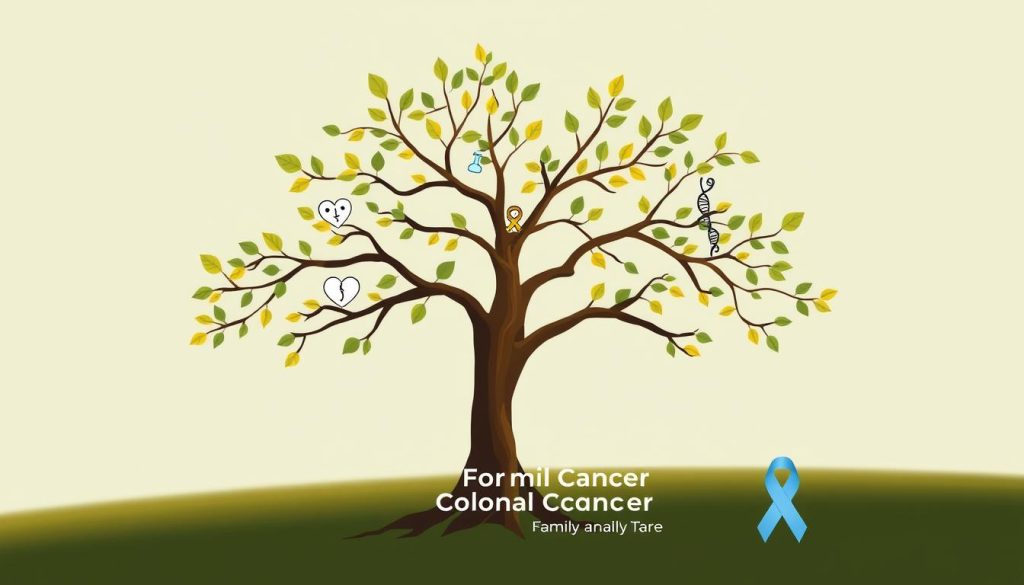
Inherited syndromes can be a warning sign. Lynch syndrome and familial adenomatous polyposis are two genetic conditions that greatly increase colon cancer risks. These conditions often lead to colorectal cancer early, sometimes before age 50.
Knowing your family’s medical history is key. It helps doctors figure out your risk level and if you need early or more frequent screenings. Here are some important points about your family history:
- First-degree relatives (parents, siblings, children) with colorectal cancer
- Age at which family members were diagnosed
- Multiple family members affected across generations
- Other cancers in the family, like endometrial or ovarian
Genetic testing might be suggested if your family history points to a hereditary syndrome. This can show specific gene mutations linked to higher colon cancer risks. With this info, you and your doctor can make a plan for screenings and prevention that’s just for you.
| Genetic Factor | Increased Risk | Recommended Screening Age |
|---|---|---|
| Lynch Syndrome | Up to 80% | 20-25 years old |
| Familial Adenomatous Polyposis | Nearly 100% | 10-12 years old |
| First-degree relative with colorectal cancer | 2-3 times average | 40 years old or 10 years before relative’s diagnosis |
Lifestyle Factors Affecting Colon Cancer Risk
Your daily habits play a big role in colon cancer risks. Let’s look at how diet, exercise, and behaviors affect your risk of getting this disease.
Diet and Nutrition Impact
What you eat is important. Eating a lot of red and processed meats can increase your risk. But, eating lots of fruits, vegetables, and whole grains can help protect you. Foods high in fiber are great for your colon.
Physical Activity Levels
Exercise is a strong ally against colon cancer. People who are active have a lower risk than those who don’t move much. Try to do at least 30 minutes of moderate activity every day.
Smoking and Alcohol Consumption
Smoking and drinking too much alcohol are big risks for colon cancer. Smokers are more likely to get colon cancer and face worse outcomes. Drinking no more than one drink a day for women and two for men can lower your risk.
| Lifestyle Factor | Impact on Colon Cancer Risk | Recommended Action |
|---|---|---|
| Diet | High red/processed meat intake increases risk | Eat more fruits, vegetables, and whole grains |
| Physical Activity | Regular exercise lowers risk | 30+ minutes of moderate activity most days |
| Smoking | Increases risk significantly | Quit smoking or avoid starting |
| Alcohol | Heavy consumption raises risk | Limit to 1-2 drinks per day maximum |
By choosing healthy habits, you can lower your colon cancer risk a lot. Remember, catching colon cancer early through screenings is very important.
When to See a Doctor
Seeing a doctor early can greatly improve treatment chances. If you keep getting the same colon cancer symptoms, you should see a doctor fast.
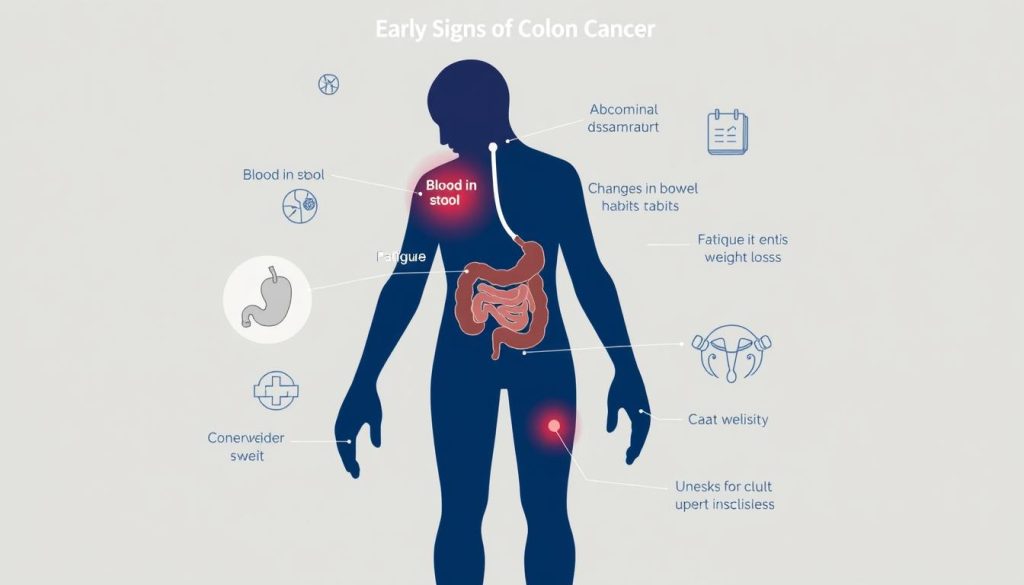
- Blood in your stool or rectal bleeding
- Unexplained weight loss or appetite changes
- Persistent abdominal pain or discomfort
- Changes in bowel habits lasting more than a few weeks
- Chronic fatigue or weakness
If you see any of these signs, book a doctor’s visit. They can check your symptoms and see if you need more tests.
Early detection is very important. If you’re 45 or older, or have a family history of colon cancer, get screened regularly. Don’t wait for symptoms to show up before you get checked.
| Symptom | Duration before seeing a doctor |
|---|---|
| Blood in stool | Immediately |
| Persistent abdominal pain | More than 2 weeks |
| Unexplained weight loss | 5% or more of body weight in 6-12 months |
| Change in bowel habits | Lasting more than 3 weeks |
Trust your gut. If something doesn’t feel right, it’s better to be safe and get checked. Your health is worth the peace of mind from a doctor’s advice.
Screening Methods and Early Detection
Regular colon cancer screening is key to catching cancer early. It finds problems before symptoms show up. This can greatly improve treatment chances and save lives.
Colonoscopy Guidelines
Colonoscopy is the top choice for screening. A doctor uses a flexible tube with a camera to check the colon. It finds and removes polyps that could turn into cancer.
Alternative Screening Options
Other screening methods are also available:
- Fecal immunochemical test (FIT)
- Stool DNA test
- CT colonography
- Flexible sigmoidoscopy
Frequency Recommendations
How often you should get screened depends on your risk and the screening method. Here’s a basic guide:
| Screening Method | Recommended Frequency |
|---|---|
| Colonoscopy | Every 10 years (age 45-75) |
| FIT | Annually |
| Stool DNA test | Every 3 years |
| CT colonography | Every 5 years |
| Flexible sigmoidoscopy | Every 5 years |
Keep in mind, these are general guidelines. Your doctor might suggest a different schedule based on your health and risk. Regular screening is essential for early detection and the best treatment outcomes.
Prevention Strategies and Lifestyle Changes
By taking control of your health, you can lower colon cancer risks. Simple changes in your lifestyle can make a big difference. Eat more colorful fruits, vegetables, and whole grains. These foods are high in fiber and help keep your digestive system healthy.
Regular exercise is also important for preventing colon cancer. Try to do at least 30 minutes of moderate activity every day. This could be a brisk walk, swimming, or cycling. Exercise helps keep you at a healthy weight and supports your gut health.
Reducing red meat and processed foods can also help. Choose lean proteins like fish or poultry instead. If you drink alcohol, do it in moderation. Quitting smoking is another big step towards preventing colon cancer. These changes not only lower your risk but also improve your overall health.
Early detection is key. Make sure to get the screenings you need based on your age and risk factors. By making these lifestyle changes and getting regular check-ups, you’re taking care of your colon health and overall well-being.
FAQ
Q: What are the most common early signs of colon cancer?
A: Early signs of colon cancer include changes in bowel habits and blood in the stool. You might also feel unexplained weight loss, abdominal pain, or fatigue. Remember, these symptoms can also mean other things, but if they keep happening, see a doctor.
Q: At what age should I start getting screened for colon cancer?
A: The American Cancer Society says to start screenings at 45 if you’re at average risk. If you have a family history or other risk factors, your doctor might suggest starting earlier. Always talk to your doctor about when to start screenings.
Q: How often should I get a colonoscopy?
A: If you’re at average risk, you should get a colonoscopy every 10 years starting at 45. But, your doctor might suggest more or less often based on your risk and past screenings. They’ll tell you how often you need it.
Q: Can lifestyle changes reduce my risk of developing colon cancer?
A: Yes, making healthy lifestyle choices can lower your risk. Eat lots of fruits, veggies, and whole grains. Stay active, drink less alcohol, don’t smoke, and keep a healthy weight. These habits can help a lot.
Q: Is blood in the stool always a sign of colon cancer?
A: Blood in the stool isn’t always colon cancer, but it’s never ignored. It can mean many things, like hemorrhoids or other diseases. But, it could also mean colon cancer, so see a doctor right away.
Q: What is the survival rate for colon cancer?
A: Survival rates for colon cancer depend on when it’s caught. If caught early (Stage I), the survival rate is over 90%. This shows why early detection is key. As the cancer gets worse, survival rates drop, making early signs and screenings very important.
Q: Are there alternative screening options to colonoscopy?
A: Yes, there are other screening options like stool tests and flexible sigmoidoscopy. But, colonoscopy is the best because it can find and remove polyps. Talk to your doctor about what’s best for you.
Q: How does family history affect my risk of colon cancer?
A: Family history greatly increases your risk of colon cancer. If a first-degree relative has had it, your risk is higher. The risk goes up even more if many family members have had it or were diagnosed young. Tell your doctor about your family history to figure out your screening plan.
Q: Can young adults get colon cancer?
A: Yes, young adults can get colon cancer, and it’s happening more often. It’s important to know the symptoms, even if you’re young. If you have symptoms, see a doctor, no matter your age.
Q: What are the stages of colon cancer?
A: Colon cancer is divided into four stages:
Stage I: Cancer is in the colon but hasn’t spread.
Stage II: Cancer has grown through the colon wall but hasn’t reached lymph nodes.
Stage III: Cancer has reached lymph nodes but not other parts of the body.
Stage IV: Cancer has spread to distant parts of the body.
Finding cancer early, at Stage I or II, greatly improves your chances of survival.












